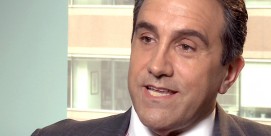In This Episode << SLIDE LEFT TO SEE ADDITIONAL SEGMENTS
Jim Wallis on Serving the Common Good
BOB ABERNETHY, host: Now we have a conversation with Jim Wallis about his new book. It is called “On God’s Side,” and it’s an appeal to overcome the country’s problems by serving the common good. Wallis is a religious activist, preacher, and editor of Sojourners magazine. He joins us from New York. And our managing editor, Kim Lawton, is here with me in the studio. Jim, welcome.
JIM WALLIS (Sojourners): Welcome, Bob. Thank you.
ABERNETHY: What is your definition of the common good?
WALLIS: You know, people are asking me what the common good is and what it means to be on God’s side, and neither has certain answers, but I think they’re the right questions. Let me give you my favorite from the book. This is from Catholic social teaching. I’ll read it right from them: “The common good is the whole network of social conditions which enable humans and groups to flourish. All are responsible for all.” So I was taking a sabbatical to write this book and watching the news at night and saw we had forgot this idea of the common good, and yet that’s what our traditions tell us.
ABERNETHY: Jim, who says what the common good is?
WALLIS: Well, the common good is found in all of our faith traditions—definitions like the Catholic one there, the black churches. I found it back to John Chrysostom in the fourth century. So it’s deeply in all our traditions, and the moral foundation of it is to love your neighbor as yourself. Now, in secular democratic traditions, it’s also there in the Golden Rule: treat others the way you want to be treated. So it’s a fundamental principle of how you treat your neighbor, and then who your neighbor is.
KIM LAWTON, managing editor: Jim, one thing I’ve noticed is that different people will say they have different ways of reaching the common good. So, for example, in some of the budget debates that I know you were involved in, you had some people saying the common good is served this way, and other people still using that language but coming up with a very different policy position. How do you reconcile that?
WALLIS: Mike Gerson, who’s a Washington Post columnist and was a George Bush speech writer, has a comment on the book. He says, “Jim and I might disagree on some policy decisions, but his call for an active consideration of the common good is more timely and urgent than ever.” I’m saying let’s have that debate. On the principle of the budget that you raise, the principle from all our traditions is you have to protect the poor and vulnerable, so you can’t reduce a deficit by increasing poverty. People on both sides could make that pledge, and then we could find a way to reform the public sector and the private sector in ways that protect the poor and vulnerable.
ABERNETHY: Jim, within many of the churches there has been a kind of a split between those who emphasize salvation and, on the other hand, those who emphasize trying to build the kingdom on Earth now. Where are you on this? On both sides?
WALLIS: Well, I’m an evangelical, which means I want to take what the Bible says seriously. And then you look at the early chapters of Matthew, you see a kingdom breaking in that’s supposed to change the world and us with it. So in the book I’ve got a long conversation about your question. It says the kind of Jesus we believe in will determine the kind of Christians we’re going to be. So I’m critical of what I call the atonement-only Gospel, where there’s no kingdom, there’s no teaching, there’s no change of anything but ourselves. That’s not what the scriptures teach, but that’s certainly in the church I grew up in. So a balanced—the change as individuals, I want to be changed in my life, but also we’re supposed to change the world. Jesus came to change the world and us with it.
LAWTON: And Jim, along those lines, in your book you do talk a lot about that the common good is served not just through policies and politics, but also in individual decisions people make in their families, their lives. How does that—how does how I live my life, in my personal life, affect the common good?
WALLIS: I’m so glad you asked that question, because a lot of people say I can’t change Washington or Wall Street. I’m saying the choices we make about how we treat our neighbors, those around us, our poor neighbors, those we may have to reach out to, our immigrant neighbors, our Muslim neighbors, our gay neighbors—those choices will change the culture. We’re seeing the one place Washington’s getting it right is around immigration reform, and why? Because from the outside they’re hearing the faith community say this, for us, is a moral issue, it’s a Gospel issue, and it’s changing our politics. We’re going to get that. All we’re going to get this year, I think, is that, but it’s going to happen because of the common good being practiced outside of Washington. It comes last to Washington.
ABERNETHY: But is it a movement, Jim, that you’re trying to put together, a movement that essentially is a national lobby, or is it, as Kim was talking about, what people do in their own lives?
WALLIS: No, it’s what people do in their own lives. Like William Wilberforce led the abolishment movement, but it wasn’t the parliamentarians. It was the movement that swept the country. So what we do in our own lives, and so I mean households. I got whole chapters on being dads and moms and parents, and I’m a little league baseball coach. Those kind of life choices are what build social movements, and that’s the only thing that ever changes politics. What we do in our own lives is what the book is about, and how that can change politics and culture, and just the first sentence of the book says, “Our life together can be better,” and that’s the hunger I think people are feeling now.
LAWTON: And Jim, just very briefly, you’ve been talking about some of these ideas for a long time. Other people have been talking about the common good. What makes you think things are different now, that’s there a new receptivity now?
WALLIS: Well, first of all, watching the political narrative at night after being all day on the sabbatical I took—quiet and reflection and study and writing—the more I watched it at night, I wasn’t engaging it, the depressing—it was polarized, paralyzed, hate, fear, anger, and I saw we’ve lost something very fundamental. So I think this can take us back to this ancient idea that can bring us together and find common ground for the common good, and especially a new generation wants to give their lives for the common good. Our audiences are half under thirty everywhere I go, and they want to give their lives for this, and that’s what I think’s going to make a difference long term.
ABERNETHY: Jim, thank you very much.
WALLIS: My pleasure.
ABERNETHY: Jim Wallis. The book is “On God’s Side. “







